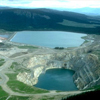MEND/NEDEM
New MEND/INAP Report
Final Phase I Summary Report: Geochemical Processes of Geotechnical Significance
A new technical report prepared by SRK Consulting summarizing key geochemical processes that can affect tailings storage facility performance and dam stability.

Acidic drainage is the largest environmental liability facing the Canadian and international mining industry. Since 1989, the Mine Environment Neutral Drainage (MEND) program has worked to develop technologies to prevent and control acidic drainage. The program is directed by a multi-stakeholder committee, with members from the mining industry, federal and provincial governments, and non-government organizations. Tremendous technical progress has been made in the areas of prediction and modelling, prevention and control, disposal technologies, lime treatment, passive treatment and monitoring and verification of technologies.
In 2002, a renewed MEND initiative was created that focussed on Canadian national and/or regional information needs. A network of Canadian experts helped to identify the top priorities that included verification of full-scale mitigation technologies, closure management, early prediction, neutral and alkaline pH drainage, sludge management, passive treatment, and cold temperature effects. Strong emphasis was placed on the need for case studies, guidance documents and technology transfer activities.
The priorities provided the framework for a multi-year research plan, and serves as the basis for the annual work plan. While the earlier MEND work related to control and limitation of liabilities, there has been a broadening of the program’s mandate to include other environmental and sustainable development issues.
Strong linkages were forged among MEND and international industry and government programs. MEND is the Canadian partner in the Global Alliance (GA), an international partnership among organizations involved in acidic drainage research that is led by the International Network for Acid Prevention.
Much progress has been made in reducing the liability; initially with acidic drainage and later expanded to cover the entire range of drainage pH. Environmentally sound technologies are now available to open, operate and decommission mines, for the short and the long-term. Mining companies and consultants have acquired a great deal more capability to deal with water contamination from mine wastes, including acid generation. However, many challenges remain, and the success of the MEND program in Canada is demonstrating significant progress in addressing them.







